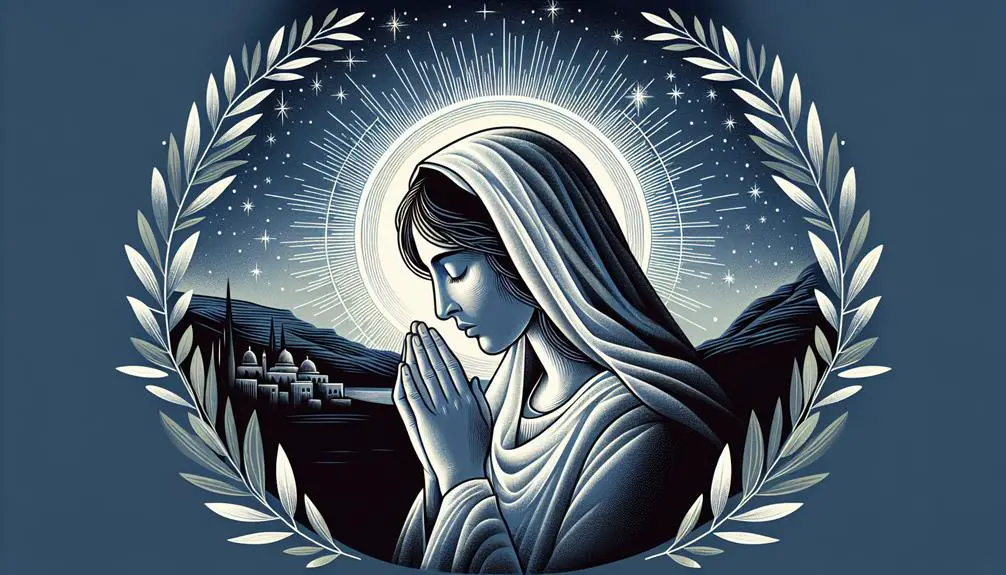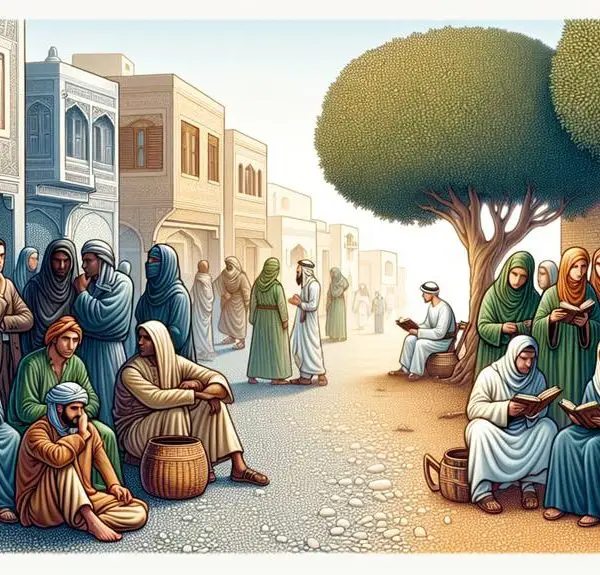Witness the power of a mother's prayer in the Bible, exploring stories of faith, desperation, and hope that resonate across ages.

A Mother's Prayer in the Bible
In the Bible, Hannah's heartfelt plea for a child showcases the profound impact of a mother's prayer. You'll find her story not just a tale of longing, but a testament to faith and dedication.
As you explore further, the narratives of Jochebed, the Canaanite woman, Mary, and the widow of Zarephath reveal the diverse yet powerful ways in which these women turned to prayer in times of desperation, hope, and gratitude.
Each story offers unique insights into the strength and faith that characterized these biblical figures, leaving you to ponder the depth of their prayers and their relevance in today's world.
Key Takeaways
- Mothers in the Bible demonstrate profound faith and resilience through prayer, often in the face of adversity.
- Their prayers encompass themes of trust, divine providence, and the power of persistent faith, leading to miracles.
- Biblical mothers teach the importance of sacrifice, motherhood, and social justice through their actions and prayers.
- The stories of these women offer timeless lessons on the impact of faith and prayer in navigating life's challenges.
Hannah's Heartfelt Plea

Hannah's heartfelt plea to God, as depicted in the Bible, exemplifies the depth of a barren woman's anguish and her profound faith in divine intervention. This narrative, deeply embedded within the fabric of religious texts, offers a rich terrain for analysis, especially concerning Hannah's Barrenness and the inherent power of prayer. Your exploration into this subject reveals the multifaceted layers of spiritual belief and the human condition's complexities.
Hannah's barrenness isn't merely a personal plight; it's a thematic device that underscores the societal pressures and spiritual trials individuals face. In your analysis, you discern how this condition serves as a catalyst for Hannah's fervent prayer, transforming her personal suffering into a testament of faith. The Bible's portrayal of this moment isn't just a recounting of events but a profound insight into the transformative potential of prayer.
The power of prayer, as demonstrated by Hannah, isn't just a call for divine intervention; it's a demonstration of unwavering faith amidst adversity. Your scholarly interpretation identifies this as a pivotal moment, where the act of praying transcends mere words, becoming a conduit for divine action. This narrative segment challenges you to consider the broader implications of prayer's power not only in biblical times but also in contemporary contexts.
In synthesizing these elements, your analysis illuminates the intricate dynamics between human despair, faith, and the divine response. Hannah's story, thus, becomes a compelling study on the resilience of the human spirit, underscored by a belief in the power of prayer to invoke change, both spiritually and materially.
The Faith of Jochebed

In the biblical narrative, Jochebed's unwavering faith, demonstrated through her actions to save her son, serves as another profound testament to the power of belief and divine providence. Faced with a decree that threatened the life of her newborn son, she crafted a plan not out of desperation, but from a place of profound faith in God's protection. Jochebed's courage to place her child in a basket on the Nile is a narrative rich with layers of trust and foresight, illustrating a mother's sacrifice that transcends the personal and touches the divine.
You can glean several insights from Jochebed's story:
- Jochebed's faith was active, not passive. She didn't wait for divine intervention; she became an agent of God's will through her actions.
- Her courage redefines motherhood. Jochebed's decision to let go of her son, to ensure his safety, challenges conventional notions of motherly protection and love.
- Sacrifice as a pathway to salvation. Her willingness to sacrifice her immediate connection with her son ensured not only his physical survival but also his future role as a deliverer of Israel.
- Trust in divine providence doesn't negate human agency. Jochebed's story exemplifies how faith and action must coexist to fulfill God's plans.
Through Jochebed's courage and the ultimate mother's sacrifice, her story encourages a deep reflection on the nature of faith, the act of letting go, and the belief in a greater plan beyond immediate understanding. Her actions, driven by faith, set into motion the liberation of a nation, showcasing the immense impact of trust in divine providence.
The Canaanite Woman's Request

Often overlooked, the Canaanite woman's request to Jesus represents a pivotal moment of faith and persistence in the biblical narrative. This episode, nestled within the Gospel accounts, showcases not just a mother's desperation for her daughter's healing but also highlights the transcendence of cultural boundaries through persistent faith.
You see, the Canaanite woman, an outsider by Jewish standards, boldly approached Jesus, breaking social norms and expectations. Her action was a profound demonstration of faith, not deterred by the initial silence and seemingly dismissive response from Jesus. It's here you witness the power of persistent faith, undaunted by obstacles, societal or otherwise.
Analyzing this interaction further, it's clear that Jesus' engagement with the Canaanite woman wasn't just about testing her faith; it was a teaching moment for his disciples and for us. Her persistence, coupled with her acknowledgment of Jesus' authority, eventually led to her request being granted. This narrative arc serves as a testament to the idea that faith can bridge cultural divides, challenging the societal constructs that often keep us apart.
Moreover, the Canaanite woman's request underscores the universal accessibility of God's mercy and grace. It reminds you that faith's reach knows no bounds, capable of transcending any barrier, be it cultural, social, or personal. Her story is a beacon for all who feel on the periphery, illuminating the path to divine intervention through unyielding faith.
In essence, the Canaanite woman's narrative is a compelling exploration of how persistent faith can challenge and overcome cultural boundaries, offering profound lessons on the nature of faith, persistence, and divine grace.
Mary's Magnificat

Echoing through the annals of scripture, Mary's Magnificat stands as a profound declaration of God's justice and mercy, revealing deep theological insights through the lens of a humble mother's experience. When you delve into the heart of this prayer, you're not just encountering ancient words; you're touching the pulse of Divine Humility and Social Justice, illuminated by a young woman's unshakeable faith.
Mary's song, rich in its historical and spiritual context, offers you a glimpse into the transformative power of divine intervention in the social fabric of humanity. It's a testament to how the lowly are elevated, and the mighty are brought down, showcasing a radical overturning of societal norms. This isn't just about the past; it's a living, breathing call for justice and humility in today's world.
Consider these aspects of Mary's Magnificat:
- Divine Humility: Mary's recognition of her lowliness and God's favor underscores the divine preference for humility over grandeur.
- Social Justice: Her song prophesies the lifting of the humble and the filling of the hungry, setting a divine precedent for justice and equality.
- Theological Depth: The Magnificat is steeped in Old Testament imagery, yet it speaks a revolutionary message of hope and change.
- Personal Transformation: Mary's journey from a humble maiden to the bearer of God's Son exemplifies the transformative potential of divine grace in human lives.
As you ponder Mary's Magnificat, let its timeless message challenge and inspire you to reflect on your role in promoting divine humility and social justice in your community.
The Widow of Zarephath's Cry

Shifting our focus from Mary's Magnificat, we now explore another profound biblical prayer, that of the Widow of Zarephath, whose cry for help reveals layers of faith amid dire scarcity. This narrative, rich in symbolic and theological depth, unfolds within a context of extreme drought and famine, positioning the Widow's trust as a pivotal element in the unfolding of Zarephath's miracle.
You'll find that the Widow's initial encounter with Elijah is marked by a test of faith. She's at the end of her resources, preparing a final meal for herself and her son, resigned to death. Yet, when Elijah requests a small portion of her dwindling supplies, her response is emblematic of a profound trust, not in the prophet per se, but in the divine providence he represents. This act of faith, risking the last of her sustenance, becomes the catalyst for Zarephath's miracle.
Analyzing the Widow's trust further, it's not merely blind faith but a dynamic interaction with divine promise. Her willingness to part with her last meal in the face of certain death reflects a trust that transcends the physical and enters the realm of the spiritual. This trust is rewarded, not just with the sustenance of flour and oil, but with the restoration of life to her son, further amplifying the miracle at Zarephath.
Thus, the Widow's cry for help, while initially borne out of desperation, metamorphoses into a testament of unyielding faith. It's a vivid illustration of how, in moments of utter scarcity, faith can precipitate divine intervention, turning despair into deliverance.
Frequently Asked Questions
How Have Modern Interpretations of These Biblical Mothers' Prayers Influenced Contemporary Parenting Philosophies?
You're looking at how modern takes on ancient prayers have shaped today's parenting styles, steering clear of their biblical roots. These interpretations, influenced heavily by cultural shifts, offer a fresh lens through which contemporary parenting philosophies are viewed.
They blend tradition with modern values, emphasizing empathy, independence, and resilience. This fusion reflects a broader societal evolution, where parenting isn't just about guidance but nurturing individual potential within a cultural context.
What Are the Theological Implications of a Mother's Prayer in the Context of Intercessory Prayer Practices Across Different Christian Denominations?
You're exploring the theological implications of a mother's prayer within the realm of intercessory prayer practices.
It's crucial to understand how prayer efficacy varies across Christian denominations, highlighting denominational differences.
This exploration sheds light on the deeper, spiritual nuances of intercession, especially from a maternal perspective.
It delves into how different faith communities perceive the power and role of a mother's prayer, enriching our understanding of spiritual advocacy.
How Do Non-Christian Religions View the Concept of a Mother's Prayer, and Are There Parallels in Their Sacred Texts or Traditions?
You're opening a can of worms, diving into how non-Christian religions perceive a mother's prayer. In Hindu traditions, the concept is deeply interwoven with practices of devotion and blessings for their children, showing a universal thread of maternal care.
Islamic parallels also exist, where prayers for offspring's guidance and protection are common. Both traditions mirror the universality of a mother's love and prayer, transcending religious boundaries with their sacred echoes.
In What Ways Have These Biblical Stories of Mothers' Prayers Been Adapted or Referenced in Modern Literature, Music, and Art?
In modern literature, music, and art, you'll find the echoes of these stories through literary motifs and artistic symbolism. Writers and artists often weave these themes into their works, subtly referencing or directly adapting the essence of a mother's prayer.
This not only enriches their creations with layers of meaning but also bridges ancient narratives with contemporary issues, highlighting the timeless nature of such prayers in shaping human experiences and emotions.
How Do Gender Studies Scholars Interpret the Role and Representation of Motherhood and Prayer in These Biblical Narratives in the Context of Ancient Patriarchal Societies?
You're diving into a rich tapestry, where feminist critique and cultural anthropology shine new light on ancient narratives. Gender studies scholars peel back layers of historical context, revealing how motherhood and prayer, woven into the fabric of patriarchal societies, offer a nuanced perspective.
Through their interpretive lens, you're invited to explore the interplay between power, gender, and faith, challenging traditional interpretations and uncovering hidden depths in these age-old stories.
Conclusion
As we've journeyed through the narratives of biblical mothers, you've witnessed the profound impact of their prayers. From Hannah's heartfelt plea to Mary's Magnificat, each story unfolds the deep faith and resilience embedded within these women.
Their requests, born out of desperation and hope, not only altered their lives but also shaped the course of history. What's more intriguing? The divine responses to these prayers hint at a larger, mysterious plan at work.
As you reflect on these narratives, consider the power of faith and the potential ripple effects of a single prayer.



Sign up